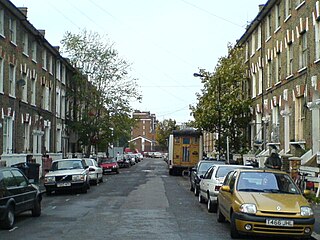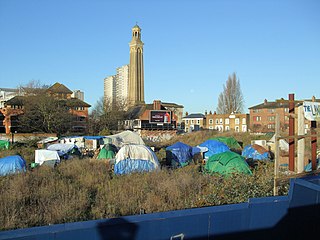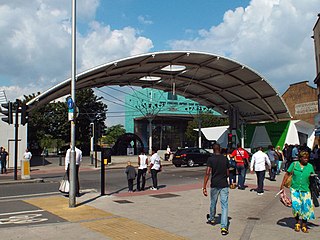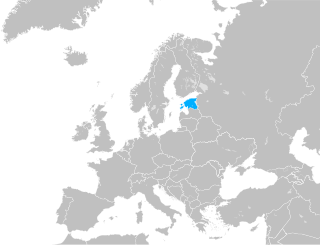Related Research Articles

Squatting is the action of occupying an abandoned or unoccupied area of land or a building, usually residential, that the squatter does not own, rent or otherwise have lawful permission to use. The United Nations estimated in 2003 that there were one billion slum residents and squatters globally. Squatting occurs worldwide and tends to occur when people find empty buildings or land to occupy for housing. It has a long history, broken down by country below.

The London Borough of Southwark in South London forms part of Inner London and is connected by bridges across the River Thames to the City of London and London Borough of Tower Hamlets. It was created in 1965 when three smaller council areas amalgamated under the London Government Act 1963. All districts of the area are within the London postal district. It is governed by Southwark London Borough Council.

Peckham is a district in south-east London, within the London Borough of Southwark. It is 3.5 miles (5.6 km) south-east of Charing Cross. At the 2001 Census the Peckham ward had a population of 14,720.

Nunhead is a suburb in the London Borough of Southwark in London, England. It is an inner-city suburb located 4 miles (6.4 km) southeast of Charing Cross. It is the location of the 52-acre (0.21 km2) Nunhead Cemetery. Nunhead has traditionally been a working-class area and, with the adjacent neighbourhoods, is currently going through a lengthy process of gentrification. Nunhead is the location of several underground reservoirs, built by the Southwark and Vauxhall Waterworks Company.

Camberwell and Peckham is a constituency represented in the House of Commons of the UK Parliament since its 1997 creation by Harriet Harman of the Labour Party. Harman had served for the previous constituency of Peckham since 1982. She is a former cabinet minister and the "Mother of the House of Commons", having the longest record of continuous service of any female MP.

St Agnes Place was a squatted street in Kennington, south London, which resisted eviction orders for more than 30 years. When a number of derelict houses were scheduled for demolition to extend Kennington Park in 1969, squatters occupied the properties and a High Court injunction prevented the demolition. The street was run by a housing cooperative until 2005, when Lambeth London Borough Council obtained an eviction order. Demolition was completed in 2007.

Self-managed social centres in the United Kingdom can be found in squatted, rented, mortgaged and fully owned buildings. These self-managed social centres differ from community centres in that they are self-organised under anti-authoritarian principles and volunteer-run, without any assistance from the state. The largest number have occurred in London from the 1980s onwards, although projects exist in most cities across the UK, linked in a network. Squatted social centres tend to be quickly evicted and therefore some projects deliberately choose a short-term existence, such as A-Spire in Leeds or the Okasional Café in Manchester. Longer term social centres include the 1 in 12 Club in Bradford, the Cowley Club in Brighton and the Sumac Centre in Nottingham, which are co-operatively owned.

Self-managed social centres in Italy exist in many cities. They are part of different left-wing political networks including anarchist, communist, socialist, and autonomist. The centres tend to be squatted and provide self-organised, self-financing spaces for alternative and noncommercial activities such as concerts, exhibitions, farmers' markets, infoshops, and migrant initiatives. Over time, some but not all projects have opted to legalize their status.

Kew Bridge Ecovillage was an ecovillage and social centre in Brentford on squatted land overlooking the River Thames at the north end of Kew Bridge in west London.

78 Lyndhurst Way was a squatted artist-run space in a Grade II listed Victorian-period house in Peckham, London in 2005 or earlier.

In England and Wales, squatting—taking possession of land or an empty house the squatter does not own—occurs for a variety of reasons which include needing a home, protest, poverty, and recreation. Many squats are residential; some are also opened as social centres. Land may be occupied by New Age travellers or treesitters.

The Peckham Arch is a 35m-span structure at the north end of Rye Lane in the Peckham, London. It was constructed in 1994 and was designed by the architects Troughton McAslan as monument to and an instigator of regeneration in a borough which had suffered from years of decline. The Arch was the first of three capital projects around Peckham Square and was followed by the construction of Peckham Library, completed in 2000. The Arch is home to a light sculpture conceived by the artist Ron Haselden.

121 Centre was a squatted self-managed social centre on Railton Road in Brixton, south London from 1981 until 1999. As an anarchist social centre, the venue hosted a bookshop, cafe, infoshop, library, meeting space, office space, printing facility, and rehearsal space. Organisations using the space included Food Not Bombs, Anarchist Black Cross prisoner aid chapters, an anarcho-feminist magazine, a squatters aid organisation, and an anarchist queer group. Regular events at 121 Centre included punk concerts, a women's cafe night, and a monthly queer night. The centre kept a low profile and was one of the longest-lasting squats in London.

Focus E15 is a campaign group formed in London in 2013 by a group of mothers threatened with eviction from their emergency accommodation in a hostel for young homeless people in Newham. The group squatted empty flats on the Carpenters Estate in Stratford in September 2014, drawing widespread attention in the mainstream media. Most of the young women were eventually rehoused within the borough, as they had requested. Having won their own battle, they have continued to protest both against the local housing policy of Newham Council and for housing rights more generally. They have done so by occupying various buildings and supporting different individual struggles.

Squatting in Australia usually refers to a person who is not the owner, taking possession of land or an empty house. In 19th century Australian history, a squatter was a settler who occupied a large tract of Aboriginal land in order to graze livestock. At first this was done illegally, later under licence from the Crown.

Squatting in the Republic of Ireland is the occupation of unused land or derelict buildings without the permission of the owner. In the 1960s, the Dublin Housing Action Committee highlighted the housing crisis by squatting buildings. From the 1990s onwards there have been occasional political squats in Cork and Dublin such as Grangegorman, the Barricade Inn, the Bolt Hostel, Connolly Barracks, That Social Centre and James Connolly House.
The Bookplace was a radical community bookshop at 13 Peckham High Street, Peckham, south east London which was open 1977–1996.

Squatting in Estonia is the occupation of unused land or derelict buildings without the permission of the owner. It is a tactic used by different groups including former factory workers, homeless people, artists and anarchists.

Urban areas in the Philippines such as Metro Manila, Metro Cebu, and Metro Davao have large informal settlements. The Philippine Statistics Authority defines a squatter, or alternatively "informal dwellers", as "One who settles on the land of another without title or right or without the owner's consent whether in urban or rural areas". Squatting is criminalized by the Urban Development and Housing Act of 1992, also known as the Lina Law. There have been various attempts to regularize squatter settlements, such as the Zonal Improvement Program and the Community Mortgage Program. In 2018, the Philippine Statistics Authority estimated that out of the country's population of about 106 million, 4.5 million were homeless.

Squatting in Scotland is criminalised by the Trespass Act 1865. Following the Highland Clearances, land raids occurred across rural Scotland in the late nineteenth and early twentieth centuries, for example in Vatersay and Knoydart. More recently there have been land occupations as both road protests and as part of the Occupy movement. Baile Hoose was occupied during the 2021 United Nations Climate Change Conference in Glasgow.
References
- 1 2 3 4 Nina Kelly (10 September 2008). "Peckham Diamond helps save community under threat". Time Out. Archived from the original on 15 February 2009. Retrieved 25 July 2012.
- 1 2 Diane Taylor (27 August 2008). "Positive occupation". The Guardian . Archived from the original on 3 September 2008. Retrieved 25 July 2012.
- ↑ Dee, E.T.C. (1 January 2016). "Squatted Social Centers in London". Contention. 4 (1). doi:10.3167/cont.2016.040109.
- ↑ Peter Watts (12 February 2009). "Peckham arts centre being evicted". Time Out. Archived from the original on 15 February 2009. Retrieved 25 July 2012.
- ↑ "Spike eviction in progress". Indymedia. Archived from the original on 18 November 2012. Retrieved 18 October 2019.
